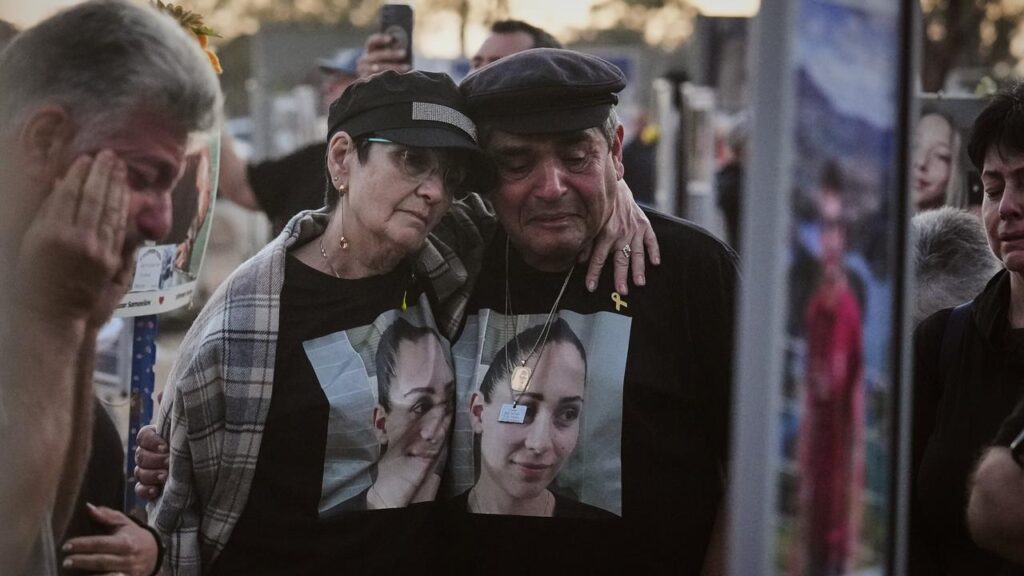Israel marks attack anniversary as Gaza talks under way
Alon Bernstein |

Thousands of people have converged on southern Israel to mourn the dead as the nation marked two years since Hamas’s October 7 attack plunged the region into a devastating war, while Israel and Hamas pressed on with indirect peace talks in Egypt.
The main memorial on Tuesday is being organised by the bereaved families, separate from a ceremony that the government will hold on the anniversary next week, according to the Hebrew calendar.
The split reflects deep divisions over Israeli Prime Minister Benjamin Netanyahu’s leadership, which many blame for the failure to secure a ceasefire that would free the remaining hostages held by the militants.

In the Gaza Strip, where Israel’s retaliatory offensive has killed tens of thousands of people and razed entire towns and cities, those who can are fleeing another Israeli invasion of Gaza City while others are sheltering in place.
It’s been two years since thousands of Hamas-led militants poured into southern Israel after a surprise barrage of rockets.
They stormed army bases, farming communities and an outdoor music festival, killing some 1200 people, mostly civilians.
They abducted 251 others, most of whom have since been released in ceasefires or other deals.
Forty-eight hostages remain inside Gaza, about 20 of them believed by Israel to still be alive.

Hamas has said it will release them only in exchange for a lasting ceasefire and an Israeli withdrawal.
Netanyahu has vowed to continue the war until all captives are returned and Hamas is disarmed.
The attack set in motion a cascade of events that led Israel into combat with Iran and its allies across the region, including Lebanon’s Hezbollah, which suffered major losses.
The United States joined Israel in attacking Iran’s military and nuclear program in a 12-day war in June.
Israel has killed several top militants as well as Iranian generals and nuclear scientists, and it has vastly depleted the military capabilities of its enemies while seizing control over most of Gaza and parts of Lebanon and Syria.

But the failure to return the hostages has left the country deeply divided, with weekly mass protests against Netanyahu.
Israel is more isolated internationally than it has been in decades.
Nearly 400 Israelis were killed and dozens abducted from the Nova music festival in the border community of Reim, which has become a memorial site.
There is no official ceremony at the Nova site due to a Jewish holiday, yet scores of people at the site gathered to mourn relatives and friends who were killed.
Meanwhile, explosions echoed from Gaza and smoke billowed over the strip.

The army said a rocket was launched from northern Gaza in the morning, but no damage or injuries were reported.
In Tel Aviv, the main memorial ceremony got under way, organised by Yonatan Shamriz, whose brother Alon was among three hostages mistakenly killed by Israeli forces after they escaped captivity early in the war.
In Egypt, in the resort of Sharm el-Sheikh, Israel and Hamas held indirect talks on Monday to discuss US President Donald Trump’s peace plan. The talks were to continue on Tuesday.
The war has already killed over 67,000 Palestinians, according to Gaza’s health ministry.
Israel’s offensive has displaced 90 per cent of Gaza’s population, and restrictions on humanitarian aid have contributed to a severe hunger crisis.

Experts and rights groups have accused Israel of genocide, and the International Criminal Court is seeking the arrest of Netanyahu and his former defence minister for using starvation as a method of war.
Israel vehemently denies the allegations, saying it is waging a lawful war of self-defence and taking extraordinary measures to avoid harming civilians.
It blames Hamas for the death and destruction in Gaza because the militants are deeply embedded in populated areas.
Hamas portrayed the October 7 attack as a response to decades of Israeli land seizures, settlement construction and military occupation.
But the attack has exacted a catastrophic toll on the Palestinians, whose dream of an independent state appears more distant than ever.
AP